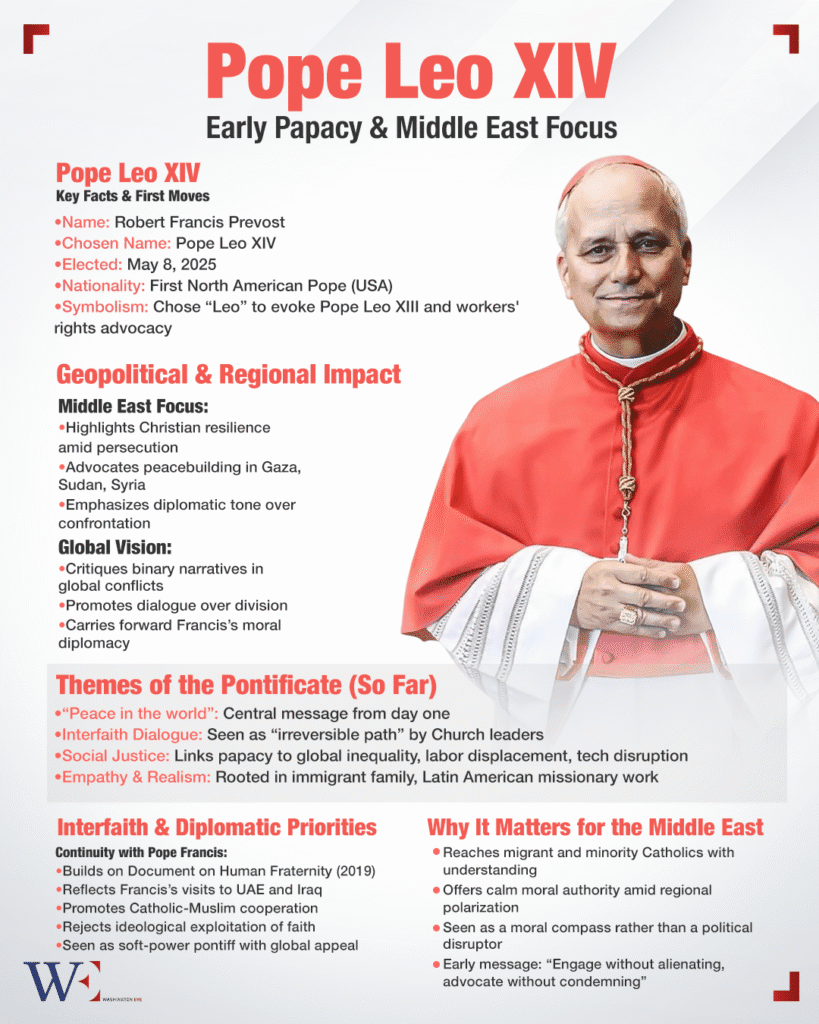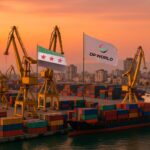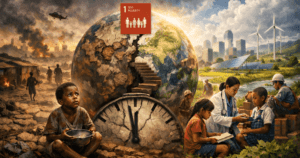When Cardinal Dominique Mamberti stepped onto the balcony of St. Peter’s Basilica on May 8 to announce the election of Robert Francis Prevost as the 269th pope, the reaction was a mixture of surprise and cautious optimism. Though the American cardinal appeared on some prediction lists, his selection as Pope Leo XIV defied widespread expectations, including among seasoned Vatican observers.
But it’s the signals from the early days of his pontificate—not the surprise of his election—that carry the most significance, particularly for the Middle East. His choice of the name “Leo” directly connects him with Pope Leo XIII, whose 1891 encyclical Rerum Novarum focused on workers’ rights amid the upheaval of the Industrial Revolution. This symbolic linkage suggests that Pope Leo XIV intends to confront today’s global inequalities, including labor displacement and technological disruption, not from the sidelines but through active moral engagement.
A Papacy with Geopolitical Gravity
Pope Leo XIV’s American nationality adds another dimension of resonance. Just as Pope John Paul II’s Polish heritage informed his resistance to communism, and Pope Francis’s Argentinian background shaped his advocacy for the Global South, Leo’s identity as the first North American pope is geopolitically loaded. It reflects a shift in the Church’s center of gravity away from Europe, aligning it more closely with global Catholicism’s demographic and political reality.
This identity also plays strongly in the Middle East, where many Catholics are migrants or part of vulnerable minority populations. Bishop Paolo Martinelli, Vicar Apostolic of Southern Arabia, emphasized that Leo’s understanding of migration—being a migrant’s son himself—equips him with the sensitivity needed to support the region’s faithful. Martinelli noted that Leo’s leadership style, like his predecessor’s, is marked by moral clarity and an openness to dialogue rather than confrontation.
A Measured, Consistent Commitment to Peace
From his very first public appearance, Pope Leo XIV emphasized a singular theme: “Peace in the world”. It was not a dramatic innovation, but a deliberate and weighty invocation—particularly in a time when Gaza, Sudan, and Syria are caught in cycles of protracted conflict. Leo’s emphasis on peace is not performative; it is part of a broader, methodical positioning of the Vatican as a voice of reason amid geopolitical chaos.
In contrast to Pope Francis’s sometimes pointed criticisms—which strained relations with some state actors—Leo has adopted a more measured tone. Yet his intention is no less forceful. In public addresses and private meetings, he has consistently affirmed his desire to mediate conflicts and elevate the Vatican’s moral role in diplomacy. When he praised Christian communities in the Middle East for “resisting the temptation to abandon” their homelands despite persecution, it was interpreted as a veiled but meaningful critique of the displacement of Christians from the West Bank.
Importantly, Leo refrains from binary narratives. He cautions against framing global conflicts in simplistic terms of good and evil and instead champions dialogue as the only viable path through deep societal fractures.
Continuity Through Interfaith Dialogue
Leo’s emerging legacy builds firmly on the foundation laid by Pope Francis, especially in interfaith cooperation. Francis’s landmark visit to the UAE in 2019 and the signing of the Document on Human Fraternity with Sheikh Ahmed El-Tayeb marked a new chapter in Catholic-Muslim relations. This commitment was further deepened by his 2021 pilgrimage to Iraq.
Leo XIV appears poised to carry this torch forward. Bishop Martinelli described interfaith dialogue as an “irreversible path” for the Church—one that Leo is both spiritually and diplomatically suited to walk. His early remarks, as well as his inclusive inaugural tone, suggest that he sees peace not merely as a political goal but as a theological imperative: a shared human destiny across religions and nations.
A Papacy That Understands the Region
What makes Pope Leo XIV’s message especially resonant in the Middle East is its combination of empathy and realism. Unlike grand declarations or theological abstractions, his appeals are grounded in lived experience—his missionary work in Latin America, his immigrant background, and his awareness of social fracture.
While it remains to be seen whether Leo will launch formal diplomatic initiatives, his words already carry the weight of a moral vision calibrated to the region’s fragility. By promoting interreligious harmony, cautioning against ideological exploitation of faith, and gently pressing for justice without inflaming geopolitical tensions, he signals a new model of papal diplomacy: one that engages without alienating, and advocates without condemning.
A Final Note: A Steady Moral Compass for a Fragmented Region
As the Middle East faces overlapping crises of identity, sovereignty, and survival, Pope Leo XIV’s voice offers a rare source of calm moral authority. His early actions suggest a continuity with Francis’s legacy of soft-power diplomacy, but also a refinement—less confrontational, more universally palatable. By rooting his papacy in historical conscience, social equity, and interfaith solidarity, Leo provides a vision not only for Catholics but for all communities seeking peace through shared values rather than sectarian divides.
In a time where moral clarity is scarce and polarization rampant, Pope Leo XIV is emerging as a pontiff of presence rather than proclamations—quiet, firm, and deeply aware of the human toll of conflict. His message resonates in the Middle East not because it is revolutionary, but because it is relational.
















